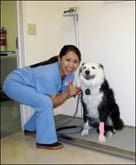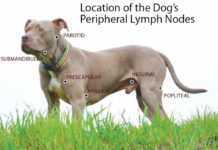Cancer Treatment for Dogs
In conventional veterinary medicine, cancer treatments consist primarily of surgery, chemotherapy, and radiation. While research in these areas has brought significant advances, the overall picture is discouraging; cancer death rates are largely unchanged. While many canine cancers are treated successfully when diagnosed early, more often the therapies, conventional or holistic, simply buy some additional time for the animal. In standard canine treatment protocols, a 12-month remission is considered a cure." While a year of dog's life is a relatively long time
What Are the Treatment Options For Dogs With Mast Cell Tumors?
Mast cell tumors (MCTs) are the most common form of malignant skin cancer in dogs, accounting for approximately 7% to 21% of all skin...
Going Long
Summer is for reading, yes? These long summer days are a perfect time to relax and enjoy a good, long read that improves your...
New Hope for Treating Cancer
An herbal extract from China is showing great promise in slowing cancer growth, and giving dogs more quality time with their guardians. When researchers at the Chinese Institute of Material Medicine discovered a region of China that did not have malaria, they found that its people drank a decoction (simmered tea) of Artemesia annua L. at the first sign of malarial symptoms.
Canine Melanoma
Canine melanoma is the umbrella term for a group of melanocytic tumor subtypes that are so complex and diverse (yet distinct from each other)...
Canine Cancer Therapy Update
Despite everything modern medicine has to offer, cancer in dogs remains among the most feared of canine diseases. Just over a year ago, Whole Dog Journal reviewed conventional, complementary, and alternative cancer therapies in a series of articles. Since then, a cancer vaccine has been approved for veterinary use and a new version of an old herbal salve has become a “first choice” for many holistic veterinarians.
Hemangioma in Dogs
The cause of hemangiomas is idiopathic (unknown). These growths usually don't appear until at least middle age. Thin-skinned, light-colored breeds often experience hemangiomas. You'll most likely find a hemangioma on the dog's trunk or legs, especially hairless areas like the lower abdomen.
What Are the Alternatives for Treating Cancer in Dogs?
The high-tech world of modern medicine has so many weapons that its “war on cancer” arsenal promises something for everyone. But all along, there have been patients, physicians, veterinarians, and animal caregivers who refuse chemotherapy, radiation treatments, surgery, prescription drugs, and other oncology protocols.
Mast Cell Tumors in Dogs: Is It Always Cancer?
Mast cell tumors (MCTs) are one of the most frequent skin cancers seen in dogs. Mast cell tumors are the reason why careful monitoring of any skin growths is essential for maintaining a healthy canine. Any new masses on the skin should be evaluated by your veterinarian. In regards to MCTs, there are several predisposed breeds including Boxers, American Staffordshire terriers, and pit bulls.
Canine Lymphoma: Risk Factors, Symptoms, Diagnosis, and Treatment
Lymphoma accounts for 7 to 24% of all canine cancers and approximately 85% of all the blood-based malignancies that occur, making it one of...
Conventional Cancer Care for Canine
Your nagging feeling was right – there really is something wrong with your dog. And it’s not just a pulled muscle or a torn toenail. It’s cancer. As you struggle to wrap your mind around that diagnosis, the veterinarian describes your options: surgery, radiation, or chemotherapy, alone or in combination. Or your dog might be eligible to participate in a clinical trial testing a new drug, or you may want to consult an oncology specialist or consider a promising new state-of-the-art treatment. There are no guarantees that any of these treatments will work, and if the prognosis is especially grim, you may want to say goodbye now. Please decide within 24 hours. This is a medical emergency.
Canine Cancer Crisis
Cancer has to be the most feared diagnosis in all of medicine, one that sends patients and their families on a bewildering journey through statistics, treatment options, and life-or-death decisions that have to be made right now. Cancer has become so widespread that the care and treatment of its human patients is one of the world’s largest industries. Now cancer affects a significant percentage of veterinary patients as well.



















